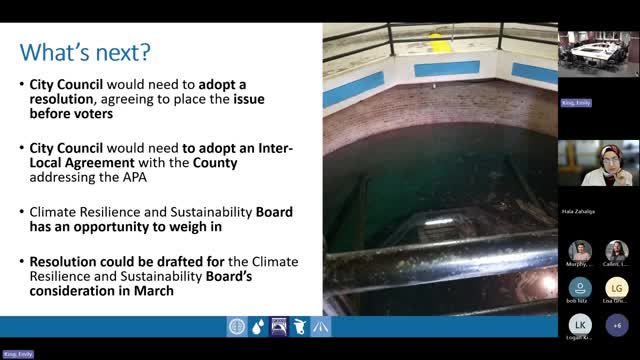City consultants present climate survey results, vulnerability index and policy audit; board weighs engagement plan for Earth Day workshop
Get AI-powered insights, summaries, and transcripts
Subscribe
Summary
Consultants for Spokane’s climate‑element update briefed the Community Resilience and Sustainability Board on survey results, an interactive vulnerability index and a policy audit and asked for the board’s input on Earth Day outreach and focus‑group planning.
City planning consultants updated the Community Resilience and Sustainability Board on three linked pieces of the city’s climate-element work: a community survey and outreach plan, a draft climate risk and vulnerability assessment (CRVA) and a policy audit intended to identify gaps the new climate element should fill.
What the consultants reported: Casey (project engagement lead) said the public survey ran Dec. 9–Jan. 31 and returned 573 responses (Casey noted that earlier outreach and distribution channels were extensive); other staff members later said they had circulated the survey widely and referenced a 1,500 figure when discussing outreach channels. The team said a written survey-analysis report would be available to the board by the next meeting and said they had compiled an email list of about 600 people who asked to stay involved.
Engagement plan: Consultants proposed an in‑person, communitywide workshop on Earth Day (April 22) at West Central Community Center, tentatively 6 p.m.–7:30 p.m., plus at least two focused follow‑up focus groups (one potentially for Spanish speakers) to reach underrepresented groups. The team said they had translated the survey into five languages and planned targeted outreach to groups including tribal representatives, senior centers, youth organizations, community centers (Karl Maxey, Northeast Community Center), schools, Spokane Conservation District, Salish School and others. Consultants and board members discussed reducing barriers to participation — food, family‑friendly timing, possible stipends for focus-group participants, bus passes and on‑site translation — and the team said some stipend/budget decisions would be scoped for focus groups.
Vulnerability index, mapping and policy audit: The consultant team described a test version of an interactive vulnerability mapping tool that combines exposure, sensitivity and adaptive‑capacity indicators. Board members urged plain‑language labels (for example, identifying health impacts and tree canopy rather than only “adaptive capacity”) and asked that the team provide methodology details and an appendix so technical users can audit how index scores are calculated. Consultants said they plan a public launch of the index at the end of February and that an early draft of the CRVA would be presented to the board in May.
Policy audit takeaways: The consultants said the audit flagged policy gaps across sectors (transportation, stormwater/CSO, housing/renters, tree canopy, public‑health preparedness and others) and recommended clearer implementation and progress‑tracking language. Board members suggested a public dashboard, clearer language about the city’s role versus community roles, and inventorying community organizations’ existing climate actions as a possible low-cost way to scale implementation.
Board feedback and next steps: Board members recommended neighborhood‑level mapping (not just ZIP codes), cross‑tab analysis by income, age, race/ethnicity and neighborhood, and geospatial overlays (for example, Gonzaga heat-mapping). The team pledged to incorporate those requests and to return with a survey analysis and refined engagement plan. The next steps described were: public index launch (end of February), Earth Day community workshop (April 22) and a draft CRVA returned to the board in May. No city policy or resolution was adopted at this meeting.
